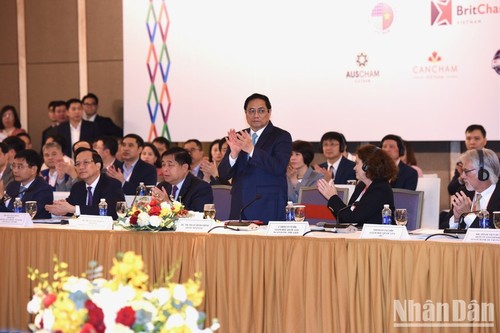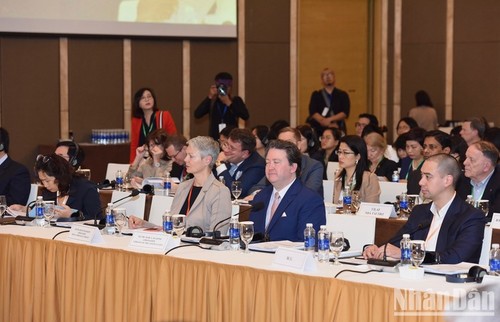 Prime Minister Pham Minh Chinh addresses the Vietnam Business Forum. (photo: Nhan dan newspaper) Prime Minister Pham Minh Chinh addresses the Vietnam Business Forum. (photo: Nhan dan newspaper) |
Vietnam is restructuring its economic and growth model to “green" and basing its development on green economy, digital economy, circular economy, and knowledge economy. Prime Minister Pham Minh Chinh’s message at the Vietnam Business Forum highlighted Vietnam’s efforts to improve its business investment environment to match the current development trend.
Businesses push rapid, sustainable development and deep integration
The Vietnamese business community is making important contributions to Vietnam’s rapid and sustainable economic development and deep integration into the global economy. After more than 37 years of renewal, Vietnam's economic scale has reached 400 billion USD with a GDP per capita of 4,100 USD. Vietnam is now among the world’s top 20 international traders.
In 2022 and the first months of 2023, Vietnam's macro-economy has been stable, with inflation under control, positive growth, and major balances secured. Social security, order, and safety have been maintained. National defense and security have been tightened. Foreign affairs and global integration have been expanded and strengthened. Last year foreign investment projects deployed a total capital of 22 billion USD, up 13.5% over 2021.
Vietnam has participated in 17 bilateral and multilateral free trade agreements with 60 other economies. Vietnam is focusing on building a socialist rule-of-law state, a socialist democracy, and a socialist-oriented market economy that makes people the center, subject, goal, and driving force of development, and the foundation for Vietnam’s growth.
 Foreign Ambassadors to Vietnam attend the VBF. (photo: Nhan dan newspaper) Foreign Ambassadors to Vietnam attend the VBF. (photo: Nhan dan newspaper) |
Building a foundation for businesses to grow
Prime Minister Chinh said Vietnam adheres to a foreign policy of independence and self-reliance and is building an independent, self-reliant economy in conjunction with proactive international integration. The government considers Vietnam’s people, natural resources, and historical and cultural traditions the decisive long-term strategic factors, and institutions, finance, technology, and advanced management the important breakthrough factors.
Vietnam has revised the legal system to resolve new issues, created conditions to support socio-economic development, reformed administrative procedures, pushed digital transformation, and built a national population database. Prime Minister Chinh said: “Administrative reform is one of three breakthroughs the government has worked on. In 2022, more than 1,000 procedures were eliminated. Digital transformation in administrative reform has been enhanced. A national database and Project 06 have been built to streamline administrative procedures at the grassroots level so businesses and individuals can take advantage of the digital environment.”
Vietnam is focused on strategic infrastructure, particularly transportation infrastructure such as high-speed roads, high-speed rail, airports, seaports, and inland waterways, as well as energy infrastructure, digital infrastructure, and climate change response infrastructure. The aim is to reduce input costs for businesses and improve their competitiveness.
Vietnam promotes innovation and entrepreneurship and focuses on human resource training digital transformation, green transformation, and high technology.
Vietnam also continues to develop an advanced culture embracing national identity, strengthen national brands, corporate brands, and product brands, and fight against corruption, negativity, and wastefulness.
Prime Minister Chinh said the government will continue to improve institutions and policies to create a favorable and equal business environment, improve national competitiveness, remove difficulties for enterprises, reduce costs for businesses, increase transparency and fairness in access to resources, protect the legitimate rights and interests of enterprises, and support enterprises in terms of capital, technology transfer, and human resource development.
Vietnam will systematically develop the markets of goods and services, finance, securities, land, real estate, and science-technology to ensure equal access to resources for development, he said.